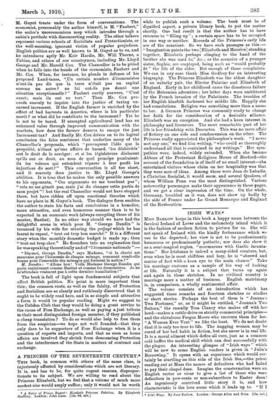A PRINCESS OF THE SEVENTEENTH CENTURY.* Tins book, in common
with others of the same class, is injuriously affected by considerations which are not literary. It is, and has to be, for quite cogent reasons, dispropor- tionate to its subject. We are willing to read about the Princess Elizabeth, but we feel that a volume of much more modest size would amply suffice; only it would not be worth
• A Sister of Prince Rupert: Elisabeth Princess Palatine. By Elizabeth Godfrey. London: John Lane. [12s. 6d. net.] while to publish such a volume. The book must be of dignified aspect, a private library book, to put the matter shortly. One bad result is that the author has to have recourse to " filling up " ; a certain space has to be occupied in one way or another. Records of the Princess's early life are of the scantiest. So we have such passages as this :— " Imagination paints the two [Elizabeth and Maurice] standing together, Elizabeth perhaps clinging to the hand of the brother she was used to," &c. ; or the memoirs of a younger sister, Sophie, are employed, being such as "would probably fit " the life of the elder. But enough of these complaints. We can in any case thank Miss Godfrey for an interesting biography. The Princess Elizabeth was the eldest daughter of an unlucky pair, the Elector Palatine and Elizabeth of England. Early in her childhood came the disastrous failure of the Bohemian adventure ; her latter days were embittered by the French invasion of the Palatinate. The troubles of her English kinsfolk darkened her middle life. Happily she had consolations. Religion was something more than a name to her. A German Princess was commonly ready to change her faith for the consideration of a desirable alliance. Elizabeth was an exception. And she had a keen interest in philosophy and literature. The most remarkable part of her life is her friendship with Descartes. This was no mere affair of flattery on one side and condescension on the other. The Princess really appreciated the philosopher's work. "I never met any one," we find him writing, " who could so thoroughly understand all that is contained in my writings." Her sym- pathies were, indeed, widely extended. When she became Abbess of the Protestant Religious House of Herford—the account of the foundation is of itself of no small interest—she entertained visitors whose claim on her hospitality was that they were men of ideas. Among these were Jean de Labadie, a Christian Socialist, it would seem, and several Quakers, of whom William Penn was the most distinguished. Various noteworthy personages make their appearance in these pages, and we get a clear impression of the time. On the whole, Germany, troubled as it was, does not show up badly by the side of France under Le Grand Monarque and England of the Restoration.














































 Previous page
Previous page